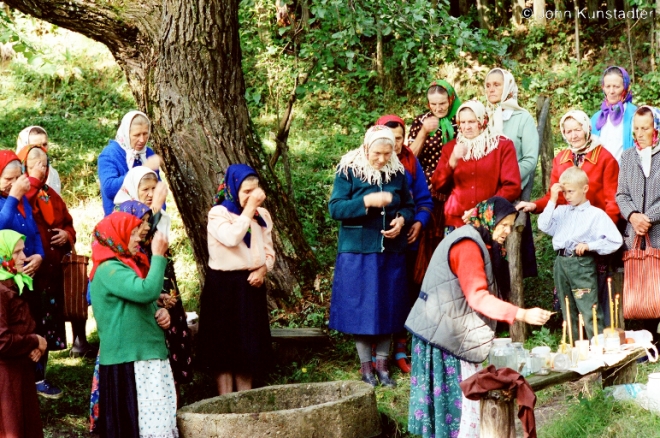Maccabees Festival (Makauje), August 14. Макаўе.
August 14 is one of the clearest examples of syncretism, the overlapping or fusion of different traditions, in the Belarusian cycle of the year.
From pre-Christian times, Belarusians have traditionally seen August 14 as marking the transition from the summer to the autumn cultivation cycle. Rain on August 14 is taken as a sign that mushrooms will be plentiful in the months to come and the date is traditionally marked by the blessing of both water from a sacred source and summer honey.
In the Orthodox calendar August 14 marks the first day of the two-week Dormition Fast, and the first of three major Orthodox feasts during this period. The fast culminates in the Feast of the Dormition on August 28, equivalent to the Roman Catholic feast of the Assumption on August 15. Orthodox Christians celebrate August 14 as Mjadovy Spas (Мядовы Спас), the Honey-Blessing Feast, or Makauje (Макаўе), the commemoration of the martyrdom for their faith of the Maccabbees. Makauje illustrates how the Church chose a similar-sounding name to absorb the pre-Christian practice around this date of sprinkling poppy seeds (мак – “mak”) in the home and stables to ward off evil spirits.
This photo shows the Makauje celebration in 2001 in the southeastern Belarusian village of Rudnja Bartalamjejeuskaja, very near the Chernobyl Exclusion Zone. Villagers have assembled at a holy well (lower middle foreground) on the outskirts of their village to read from the liturgy and to wash their faces and eyes — for divine protection and insight — in water from the well.
I was exceptionally fortunate to be able to travel on this expedition to Rudnja Bartalamjejeuskaja with the outstanding Belarusian ethnographer-photographer Dzjanis Ramanjuk and his sister. Deaths of the more elderly women since 2001 have deprived the village of continuity with its ancient tradition and the celebration is reportedly no longer held there.
Makauje, Rudnja Bartalamjejeuskaja 2001. Макаўе, Рудня Барталамееўская 2001 год.
